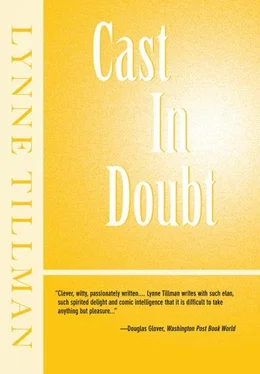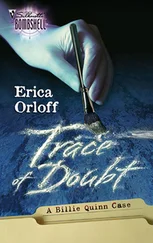Yannis arrived home late last night, his tail between his legs. He is sporting a ghastly black-and-blue eye, a shiner, we used to say, and is terrifically vague about his lost days and nights. Lost to me, not to him, I suppose, as he knows what he was doing and I do not. Yet because of the palpable presence of John and the comfort of inimitable Gwen — at least in some respects — I’m indifferent to his evasiveness. I do not press him as I would have in the recent past. I refuse to react to his shenanigans. I do not cajole and barter. Yannis is startled by the change in my attitude: my lack of reaction has sharply shifted things for him. He doesn’t know what to do to catch hold of me again. I see him thinking, plotting how to do it. It is the same look that overcomes his normally placid features when he is fishing at the harbor and something tugs on his line. He snaps to with a mixture of stealth and cunning, a tiger about to pounce, then he jerks the rod to fix the hook in the poor fish’s gaping mouth. Thus is he thinking about me, with the same determined expression on his face. One day Yannis may find he’s lost me, that I have not been adequately hooked. That I have not taken the bait. Look, I am saying to him, I am swimming away. You cannot catch me. You do not have the right bait and lure. And soon, I say to myself, seeing his power diminish, he may leave me — I can sustain this thought — and that will be all right. Nothing is forever, after all, except common death.
Distracted — or perhaps in order to distract myself — I choose a book from the night table, one of Alicia’s, entitled The Gypsies , and I turn to the index, where I discover a citation for Death. Under the subheading, “Death and Funeral Rites,” I read that “a Gypsy does not die in his bed…no more than birth, may death pollute the home.” “On the announcement of death, the whole tribe begins to weep or cry out, even yell.” I should have liked to have witnessed such behavior at my mother’s funeral. My brother would never wail; even the need to wail and cry out would be beyond his comprehension. Actually he would be incapable of wailing, I’m certain. At our funeral rite for Mother, there were some wet eyes, and several cheeks were damp with tears, the teardrops pressed into or blotted onto the skin with handkerchiefs.
But oh I have wailed, I have brayed at the moon, I have found myself on my knees, howling. I have seen the best minds of my generation…and really I disdained the Beats then. Yet even I, in that funereal group, was contained, tight. In fact, I was tight. How else to get through such a sad ceremony, surrounded by the living dead.
It seems the Gypsies have a different conception of death from us. Once they bury one of their own, they forget the place of burial. That makes sense for a nomadic people, for travelers. Fascinating, fascinating, I mutter aloud — Yannis is not, I hope, within earshot. I converse with the invisible interlocutor who, I often imagine, stands near me to hear my amazement, to absorb my thinking, and to encourage and feel my rising excitement. At times I recognize that this other must be my mother, as she was the first person who shaped and shared my intellectual concerns; she did encourage them, and me.
I read on, “There remains the matter of protecting oneself against the return of the deceased in the form of a ghost, a vampire or a mulo.” (I look up mulo: “The mulo really seems to be in effect ‘Death’s Double. He is not the corpse; he is the man himself in the form of his double.”) My mother must have become a ghost, one I cannot yet see. Perhaps I have not earned the right to see her. But why not? I squint and try. I rub my eyes and try again. I can nearly discern her face, but her pale image dissipates and dissolves into the air. This would not count as her making a visitation, in any case, but rather as my failed attempt at bringing her back. Why wouldn’t she want to visit me? I oughtn’t read on.
A weight settles upon my chest. If I close my eyes I can see her, I can see her next to my bed, reading to me. She was a lovely woman. My unfortunate looks come from my father. I touch my nose, which is like his, bulbous. How palpable the past is! I shift in my bed as if to throw sadness off. Yet her loss weighs me down. Loss, oughtn’t you be light? I find my notebook and pen, sit up straight in bed, fluff the pillows behind me, touch my back, notice I’ve lost weight, and, even without coffee, read on.
There are five to six million Gypsies distributed throughout our world — the book was published in English in 1963, in French in 1961. In the introduction, it states that “Above all else, Gypsies are feared…400,000 Gypsies were shot, hanged or gassed in the Nazi concentration camps…” I skim along and my eye lights upon this: “The Gypsies represent an exceptional case: they are the unique example of an ethnic whole perfectly defined, which, through space and time for more than a thousand years, and beyond the frontiers of Europe, has achieved success in a gigantic migration — without ever having consented to any alteration as regards the originality and singleness of their race.” The writer of this is a Frenchman, as many Gypsiologists, as they’re called, seem to be.
It must be the Gypsy originality and singleness that attract Helen. I would venture this analysis even at this early date. Except that she is not interested, she said, in originality. But perhaps if it applied to people, she might make an exception. I take a few notes. It could be their lack of having been altered by others, of being a defiant race. But are they a race? I wonder if the surrealists, who were primarily French — or at least one could say the movement bloomed, centered in Paris — I wonder if they too were fascinated by the Gypsies. I must research this. If I believe in anything, anything at all, it is in the value of research. It is one of my household gods. These notes will go into the file marked Questions about Helen.
Yannis enters the room, carrying freshly brewed coffee. He is smiling engagingly. One must be engaged to be engaging. Engaging, engaged, these words trigger a memory that is in its own way surreal. For something surreal happened the other night — or was it just last night? — something between John and Gwen. I must concentrate. A vague pattern of sounds clusters about my ears; the memory of sound is even more elusive than that of images. But aromas have enormous vitality. And an equally vague set of images forces itself before my eyes. Gwen and John are dancing; Christos is playing music tapes on his tinny machine. Yes, I see that now. I rub my eyes. But what occurred next? I am circling about it with my mind. An engagement ring. No, a circle pin. Yes, something about a circle pin. They come off the dance floor and sit near me. Gwen is going on about how she would have worn a circle pin in the fifties, in college, that she’d always wanted to, but couldn’t because she was black — a Negro, yes, she may have said a Negro, and she drew out the two syllables. Circle pins were for Breck girls with blond hair, she said. It is not like her to mention her race, as I’ve explained, but she was high. She is especially adamant when inebriated. John simply couldn’t understand her. He kept repeating, A circle pin — man that’s weird, man. He didn’t get it, he said, and made fun of Gwen for being straight. Circle pins aren’t hip, I believe he announced — without irony. He was, I suppose, merely trying to be playful or amusing. Gwen wasn’t having it. She pulled up her small frame — she tends to curl into herself like a cat — and hissed to John that he was a privileged tot who wouldn’t know anything about what life was or was not like for her. He was, I think she berated him, a hopelessly unhip white boy, and she may have used the epithet “white Negro.” which was a fifties term, if memory serves. At this juncture I believe I attempted some witticism about how the circle pin itself might symbolically shed light on the problem. I tried my best to put it all on a different plane, but such attempts are mostly futile. She may have slapped him. I think she did. Someone slapped someone that night.
Читать дальше












